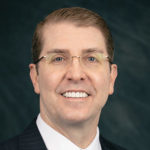
Ambulatory surgery centers (ASCs) are one of the fastest-growing segments of the healthcare industry. Research from McKinsey suggests that by 2023, the ASC market is expected to grow by 6%—making it potentially a $36 billion industry. While the shift in care from hospitals to ASCs is happening at a rapid rate, it comes with a number of challenges—from changing policies and regulations, to reimbursement issues and purchaser preferences, to innovation-based clinical practice changes and competition among providers.
Shift of care summit
A Shift of Care Summit was held in early March for a small group of HealthTrust member organizations to discuss many of those issues. How should hospitals best prepare for this shift in procedures to entities that could be independently owned, or owned by physicians, private equity firms or the hospitals themselves? Do competing interests align or co-exist?
Lending a physician perspective to the summit conversation and to the feature in this issue of The Source is Michael Hicks, M.D., MBA, MHCM, FACHE, National Medical Director, HCA Healthcare’s Ambulatory Surgery Division. Dr. Hicks says that physicians and patients share like interests when it comes to the three E’s in ASC-based procedures: efficiency, ease of use and experience.
ASCs represent just one of five areas where The Advisory Board suggests health systems need to prepare for a shift. (Others include office-based diagnostics, home-based care, digital health and convenient care clinics.) Exponential growth through the pandemic helped fuel the shift, and the Centers for Medicare & Medicaid’s expanded reimbursement and coverage has made it all the more favorable.
ASCs are expanding their scope of procedure types beyond the traditional specialties. For example, there has been a decline in the historically higher-volume service lines of gastroenterology and ophthalmology, while growth is expected in general surgery, urology, orthopedics and pain management. These service lines have moderate volume in ASCs today.
Summit attendees used scenario planning to analyze future events while considering alternative possible outcomes. Small groups broke out and identified four of the most likely shift-of-care scenarios that health system leaders may face, including key features and signposts for each.
Future learning
The learnings from the summit will be the basis of a part 2 summit later this year, and the resulting discussion will produce strategies for providers to be responsive, resilient and effective in their decision-making through the journey in this shift of care.
If you would like to participate in the Shift of Care Summit later this year, please contact your HealthTrust Account Manager or Kim Wright, RN, AVP of Clinical Services, at kimberly.wright@healthtrustpg.com.

John Young, M.D., MBA, FACHE
Chief Medical Officer, HealthTrust
Executive Publisher & Editor-at-large, The Source magazine






